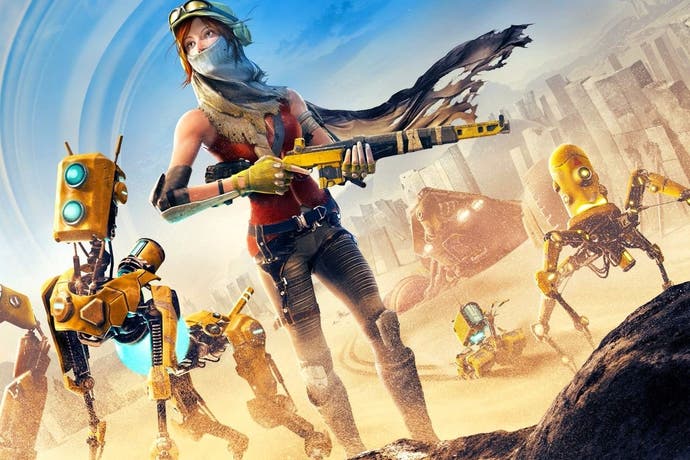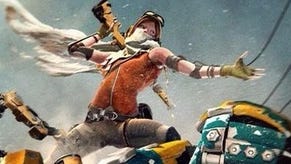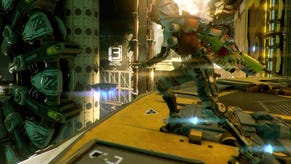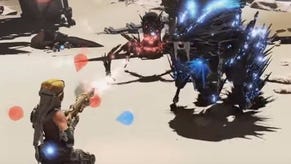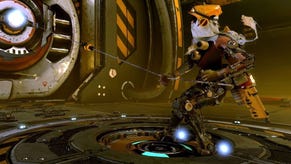ReCore feels more Metroid than Mega Man
And that's a good thing.
If you're looking for pedigree, it doesn't really come much stronger than this. Directed by the man who helmed the Metroid Prime trilogy. Written by the man who helped build the Halo universe. And with the involvement of an outspoken Japanese development legend who's never far away from the headlines.
So why aren't more people getting excited about Windows 10 and Xbox One exclusive ReCore?
Perhaps it's the less than stellar reputation of Comcept, the Japanese studio headed up by Mega Man creator Keiji Inafune, most recently responsible for the troubled Mighty No. 9. Maybe it's the price point - ReCore will be coming in at £29.99, undercutting its competition by some margin - giving rise to a perception of it as something of a budget game.
Or maybe it's because ReCore's blend of exploration and action doesn't lend itself so well to an E3 stage or a two-minute trailer. Having sampled some 30 minutes of the game, there's a definite spark to be found in its wastelands, and amidst the sand-dusted ruins that have more personality than your average post-apocalyptic backdrop. It's clear, too, that this is much more Metroid than Mega Man, with gear gating and traversal puzzles that will be familiar to anyone who's played the Prime trilogy.
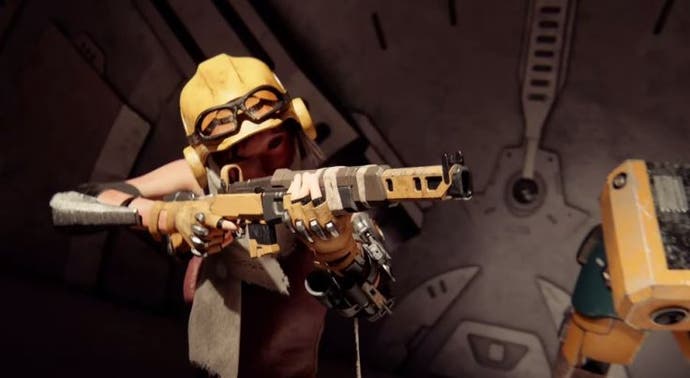
That much isn't surprising when you learn that ReCore is primarily an Armature joint, with the bulk of development taking place in the Austin developer that's formed of veterans formerly of Retro Studios, and where the game is being directed by Mark Pacini, the man who oversaw all three Metroid Prime games. What a delight it is to see the team allowed to stretch its legs after the enjoyable handheld Arkham series spin-off Blackgate, and having been frustrated by the cancellation of the promising Mega Man first-person shooter.
ReCore has more than mere glimmers of that Prime pedigree. In the combat you'll feel it in the strafe-boost you employ as the game's main protagonist Joule, unleashing charge shots that come in four different flavours. It's a simple set-up - there are four different colours of ammo selected via the d-pad, which can be matched to different coloured enemies for added damage - and you'll see it in the various abilities of your mech companions. Sometimes, the debt to Metroid Prime feels explicit - one of the three companions is a spider-like robot that can scuttle along railings, allowing you to access new areas in much the same way Samus' morph ball opened up environments.
In the final game, an overworld that's broken up by gear gating promises to make ReCore's lineage that little bit clearer. I'm afforded only a brief, stolen glimpse of the broader reaches of Far Eden, the parched planet that hosts ReCore and the one to which you wake after an extended period of cryosleep, but what's striking about the overworld and the smaller dungeons within is the sense of place - under those sands and in those ruins there's the pull of a grand mystery that's waiting to be discovered. For that, you can thank the talents of Joseph Staten. Having worked closely on the cinematics of Bungie's Halo and helped create the mythology of Destiny, this is a man who knows how to build worlds.
Staten returned to Microsoft at the beginning of 2014, taking on a broader creative director role within Microsoft Studios. "I'm focussed on narrative and IP building - one day I might be writing cinematic scripts for ReCore, another day I might be with the Scalebound team on the lore, another day I might be with the licensing team on Crackdown ancillary products," he says of his day-to-day duties. "It can be a lot of things. I work with [Microsoft Studio's head of publishing] Shannon Loftis, I do a lot of new business and I'm really involved in the marketing side on trailers and cinematics - that's where I got started. Really, it can be anything. It's very different rhythm to 15 years of Bungie, which was very straight ahead."
Staten was also responsible for much of the world building on Destiny, though the bulk of his work on the game was cut or reconfigured as the ambitious multiplayer shooter underwent radical challenges at the eleventh hour (as chronicled brilliantly on Kotaku late last year). "I spent almost five years on that project, after Halo 3: ODST. I started doing all the pre-production and concept work on that. Like Halo I've still got a lot of fond feelings for that world and even though some ideas were thrown away there's still a tonne that wasn't.
"As a writer I don't get too hung up on what line of dialogue makes it, or what cinematic was changed or cut. There's a great deal in just writing all the words that never end up spoken in a game. I always tell writers coming up in the business that the most important writing you do isn't the line the actor says, it's what you write down in an email that tells an environment artist to build something, or gets a character modeller to understand why it's a dog and not a fox. That's the writing I've always enjoyed most."
ReCore marks Staten's return to the nitty gritty of writing after taking on a more high-level job at Microsoft upon leaving Bungie. "I was very thankful to come in and stop looking at Power Point and all the other things I do - I'm half-joking, this is Microsoft. I help oversee all the other stuff we're working on behind the scenes, and I oftentimes feel spread pretty thin. It's been nice to be a writer on this game and go in deep and really be able to affect change on a fundamental level, and help."
Staten's been on board with ReCore since Microsoft signed it up, working alongside Armature to shape and build a world that, like Halo and Destiny, is a science fiction that's powered by a sense of fantasy, and a deep underlying mystery. It's a more modest game than either of those, but it's also one that is deserving of respect and that might well be a pleasant surprise for many when it comes out in September.
"I fervently preach the gospel that everything has the chance to be a Halo, or the chance to be a Destiny," says Staten of ReCore's chances of catching on. "You just have to build it right. So that means making a world that people want to spend time in, a world where people find mystery around every corner. And you can see that spirit in ReCore. It's hopefully one of the things I bring to this game. Let's build it big, let's build it for the future. If we're lucky enough to get a sequel, great, we've already got some ideas. Every game has a shot, every game should be given the right chance to succeed at that level, and I hope ReCore does. It's got a lot of heart."
